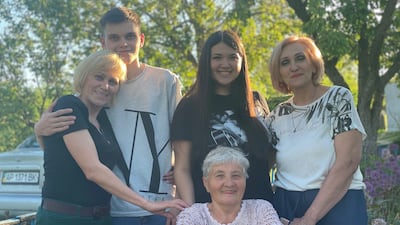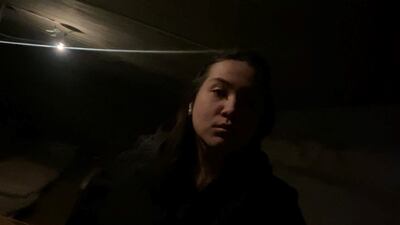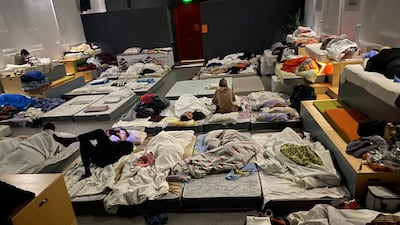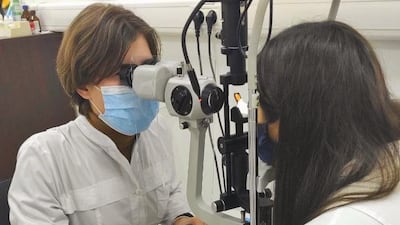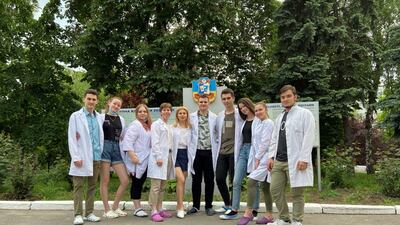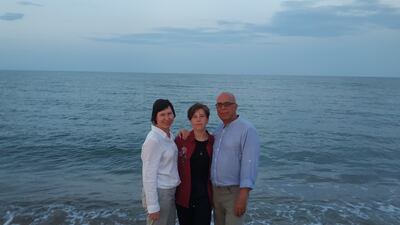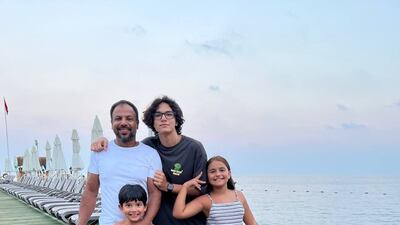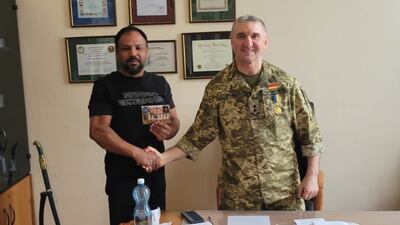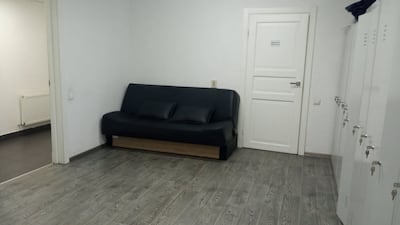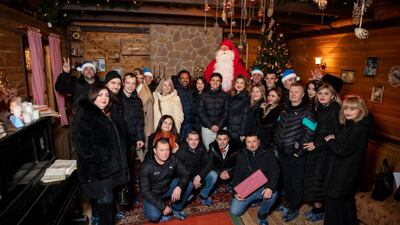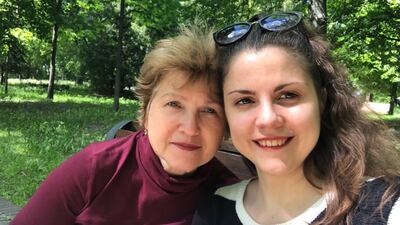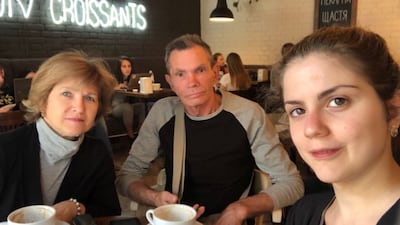Six months after the first Russian explosions hit Ukraine, men and women have spoken of a collective mission to see their country through a war that has no end in sight.
Ducking into bomb shelters when they hear sirens and volunteering near the front lines, doctors, students, professors and businessmen continue to work in Ukraine despite sustained attacks by the Russian army.
The National has spoken to residents, who say leaving the country is not an option.
In Zaporizhzhia, a city in south-eastern Ukraine, medics express fears of a disaster at Europe’s largest nuclear power plant.
In Kiev, a businessman has spoken of the urgent need for continuing support, food and medicines.
Ukrainians who fled to neighbouring Poland have recounted daily anxiety about the safety of their loved ones as Russian forces draw closer.
August 24 is an important day as it marks the decision in 1991 by Ukraine’s Parliament to separate from the Soviet Union.
While some Ukrainian cities have banned large independence gatherings, worried this would attract Russian missile strikes, concerts will be held in Poland to celebrate the 31-year milestone.
Under the shadow of a nuclear disaster

Dr Kateryna Pak, 25, a teaching assistant at the Zaporizhzhia State Medical University’s department of infectious diseases, feels the mental pressure of living about 100 kilometres north of the nuclear plant, a two-hour drive by car.
The site has been under Russian control since March and officials in Kyiv have accused Moscow of endangering regional security when civilians were killed in recent shelling near the power plant.
“We are scared about the situation at the nuclear station, mentally it is very hard but we are holding on,” Dr Pak said.
“It will be grief for not only Ukraine but the world if Russian occupiers attack it. Rockets and shelling are impacting their daily life.
"People are very nervous. Many friends have gone to other countries or to safer areas of Ukraine. It is a nightmare. But I live in Zaporizhzhia and I will not leave my city.”
The doctor’s mother and grandmother live in Novovasilevka village under Russian control and she worries daily about their safety.
She volunteered in a centre assisting other doctors treating victims who fled neighbouring areas under attack.
“I remember a mother and her 9-year-old son who came from Mariupol. That was his birthday but the father of that little boy had died the night they came to Zaporizhzhia. It was terrible," she said.
“In the first days, I cried a lot. I am angry about Russian aggression and I’m also scared about the occupation.
“We try to live each day, we don’t have any other choice.”
Biggest fear to lose family and Ukraine

Oleksandra Lykhasenko, 21, a student at Zaporizhzhia State Medical University, said her family remains in the city despite the Russian army closing in.
They do not want to be parted from her grandmother, 83, who is too frail to make the road journey.
“We decided it is better to stay together than separate,” said Ms Lykhasenko.
“My biggest fear is to lose my family and to lose Ukraine.”
From believing the Russian attacks would be short lived, Ms Lykhasenko is prepared for a protracted battle.
“Everyday people are dying, not only soldiers and I want it to be over,” she said.
“But now, I understand that it’s a long process.”
She volunteers in a neurological department, treating soldiers and civilians, where she constantly sees patients grappling with mental health issues.
“Every day there are new soldiers. They don’t say exactly what they feel and want to go back to help their comrades," she said.
“One soldier said he can’t sleep as he always sees soldiers who died come to him in his sleep.
“So many will have trauma even after we have victory.”
The proximity of the Zaporizhzhia nuclear plant has revived memories of the Chernobyl accident, the world’s worst nuclear disaster that spread radiation across Europe in 1986.
At the start of the Russian invasion, Moscow's troops captured the decommissioned Chernobyl plant in northern Ukraine and held staff captive before withdrawing in March, Ukrainian officials have said.
“We are really scared about what will happen with the Zaporizhzhia nuclear plant,” Ms Lykhasenko said.
"Ukrainians experienced Chernobyl and don’t want to experience it one more time."
Ambushing soldiers with cans of tuna

A Ukrainian businessman of Indian origin, Nitesh Pal, drives lorries loaded with canned seafood into volatile areas his staff are uneasy entering.
A racing enthusiast, Mr Pal recently organised a competition in Kyiv for more than 20 bikers, with the proceeds going to the army.
“Whenever I drive I carry cases of tuna to give away when I see our soldiers,” said Mr Pal, co-owner of Polar Seafood Ukraine, a subsidiary of a popular Danish brand.
“They make us feel safe. I give away these cans at every checkpoint."
He pulls up in front of lorries and gives soldiers cans of tuna.
“Soldiers are well taken care of but in Ukraine, there is a big problem of logistics," Mr Pal said.
"Even though help is coming in, people are not getting food fast enough and they are hungry.”
He was among the first batch of people granted citizenship when President Volodymyr Zelenskyy took office in 2019.
Although eligible to leave the country with three children under the age of 18, he stays to be part of the struggle of his adopted country.
Weeks into the Russian invasion, he ensured his family and more than 20 staff crossed the western border into Romania to safety.
He recently drove more than 2,000 kilometres to Turkey to see his family.
He will take supplies of diapers, baby food and non-perishable supplies like canned beans back to Kyiv.
Assistance for needy Ukrainians is a priority as is keeping the business running and stocking supermarket shelves.
“When the wives of my staff say they are scared about them driving to Kharkiv and Zaporizhzhia because of the fighting, then I drive,” he said.
“I must be willing to drive if I ask someone to go there. I’m alone, my family is not with me so it’s easier.
“Businesses need to survive. Six months and there is no turning back. Everybody is standing together and does their bit.”
‘Unbearable’ loss in a foreign land

Olena Kazmazovska, 24, is among three million Ukrainian refugees who fled the Russian invasion.
She worries about her father, 61, who refuses to leave their home in Kropyvtyskyi in central Ukraine.
Ms Kazmazovska moved with her mother to Wroclaw, a Polish city that has provided shelter to tens of thousands of Ukrainians.
“Shelling in my home city has worsened. It is not far from where my father lives but he is adamant he will not leave,” said Ms Kazmazovska.
They live in an apartment provided by the Wroclaw municipal authorities.
“We keep in contact with him several times every day to check how he is doing,” she said.
She has met other refugees with tragic stories.
“A woman from Mariupol lost her husband and son. She lives in Wroclaw but it is completely destroyed. She does not know how to live her life," said Ms Kazmazovska.
“She is completely alone with unbearable loss in a foreign land. Your heart breaks knowing how lives are ruined.”
She will join other refugees in celebrations in the main city square and listen to Polish and Ukrainian bands on Wednesday.
“We have been granted the most important and expensive help which is the accommodation,” she said.
“But we always worry how long will the war will be and how long will the support last.”
